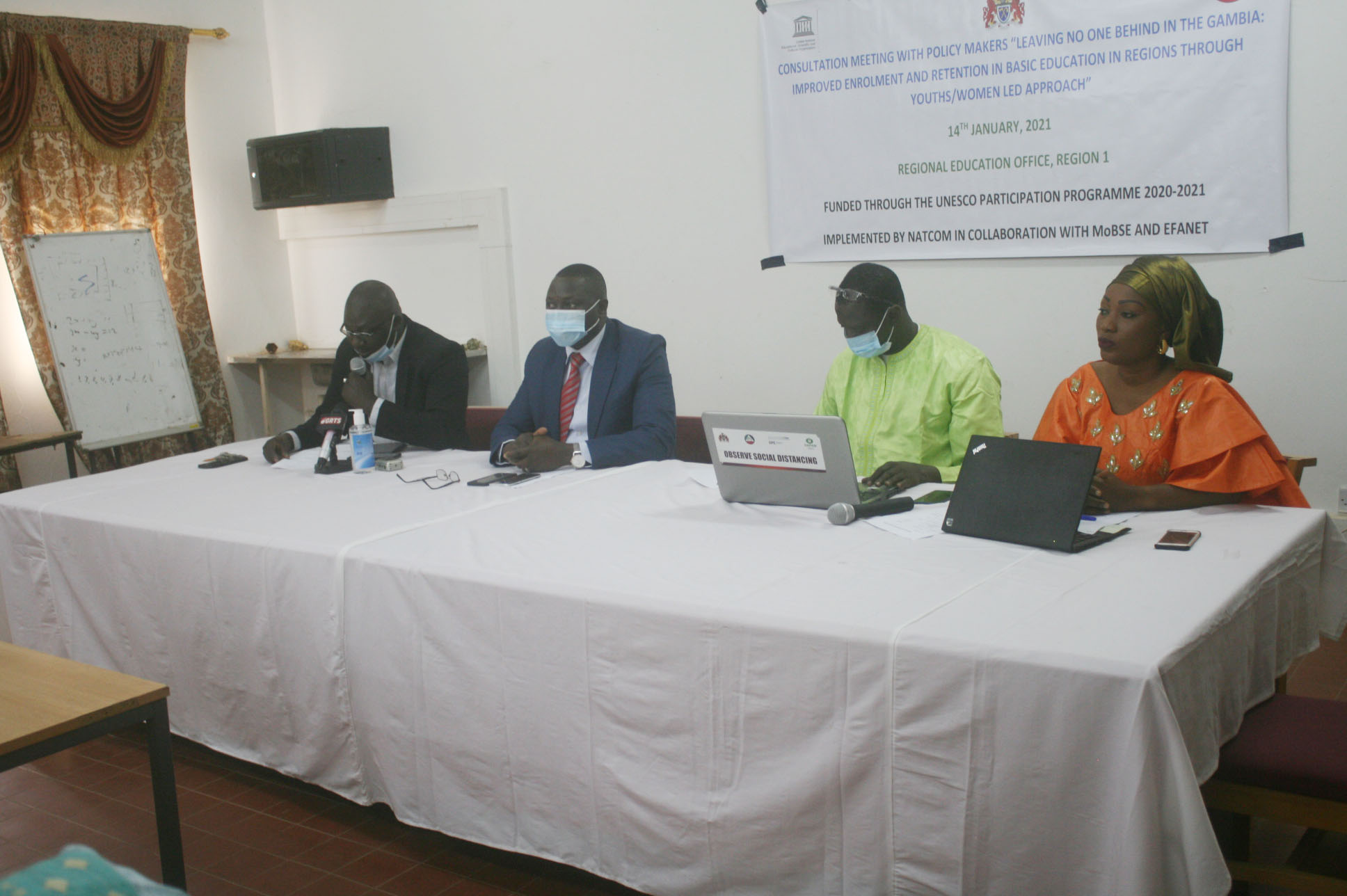By Yunus S Saliu
The National Commission for UNESCO in collaboration with EFANet and MoBSE Thursday held a daylong forum with policy makers and education partners.
The forum was meant to complementing the efforts of the Ministry of Basic and Secondary Education in boosting enrolment and eliminating of school dropout in The Gambia,
The daylong forum held at the Educational Regional Directorate, Region 1, New Jewshwang brought together different stakeholders and some education partners who deliberated on the issue, way forward and recommendations under the project theme – ‘Leaving No One Behind in The Gambia: Improved Enrolment and Retention in Basic Education in Regions Through Youths/Women Led Approach.’
It is a project funded under the UNESCO 2020-2021 participation programme and implemented by the Gambia National Commission for UNESCO in collaboration with Education for All Campaign Network (EFAnet) and Ministry of Basic and Secondary Education through the Regional Education Directorates 4, 5, and 6 respectively.
Maimuna Sidibeh, Principal Programme Officer of the Gambia Natcom-UNESCO noted the importance of education as the Constitution of The Gambia and the policies of MoBSE geared towards the provision of basic and secondary education for Gambians, with focus on how to meet the current global education targets by 2030.
The principal intent of the project, she said is to complement the efforts of the MoBSE in boosting enrolment, and eliminating of school dropout in The Gambia especially in regions 4, 5, and 6.
She reminded the lawmakers and policy experts that they have barely less than 10 years to reach the timeline of the Agenda 2030 on SDG4 – ‘ensure inclusive and equitable quality education and promote lifelong learning opportunities for all.’
Addressing the forum, Mr Louis Moses Mendy, Permanent Secretary at Ministry of Basic and Secondary Education said the two policy that proceeded the 2016, 2013 policies emphasizes in serious terms the need for the Ministry “to provide equity, relevant access quality education to every student or school going child in this country.”
Discussing the education sector strategy on enrolment, he said the Ministry decided to center discourse on region 4, 5 and 6 respectively for specific reasons, taking into consideration that “there are lots of schools in this country particularly in Region 1 and 2 that a child living next door will (reach) walk to and find a school.”
But in other regions “it is not the case, that’s why the focus is on region 4, 5 and 6 and reason for this convergence. So, it is not that the Ministry is not interested in region 1 and 2,” he noted.
He advised stakeholders to look critically what is needed so that these aforementioned regions could be helped to provide equity, access and quality education just like the child in the center of the city of Banjul.
“Data has informed us that students in this regions often start school at the age of 7 and above whereas those in regions 1 and 2 do start as early as age of 2 as they are taking to daycare center in the process they begin education in some forms,” he explained saying they cannot be compared to child exposed to school at age of 7.
Discussing disadvantages of being exposed to school at the age of 7 he said it include sitting and joining much younger students in the classroom and this involve two things – bullying by the younger ones in the classroom which can as well cause dropout from school without reaching completion stage.
“This is why the issue of retention is important for us to discuss in this forum. Therefore it is our concern to engage all relevant stakeholders to encourage parents to send their children to school at appropriate time instead of waiting till they are grown up to avoid falling out of school before completion stage,” he emphasized.
PS Mendy however noted that the Ministry has done well in term of access “in 2007 to 2017 we departed from 88% to 108% in term of access to school but contrary to that in term of quality, retention, gross enrolment rate (GER) and next enrolment rate (NER) we still need to work harder particularly in regions 4, 5, 6. This is because the percentages are not encouraging at all.”
Kebba Omar Jarjusey EFANet National Coordinator disclosed that their core mandate is to provide inclusive, equitable, quality education for all citizenries of this country for lifelong learning.
The National Coordinator expressed their appreciation over the good gestures from The Gambia Natcom-UNESCO for leading this process by supporting and engaging the communities to know what are some of the issues relating to enrolment and to improve enrolment retention and completion of school levels.
EFANet as an education advocacy group, he said, the forum was important as it gave opportunity to hear the views of the relevant stakeholders as they want to engage on advocating for a change.





